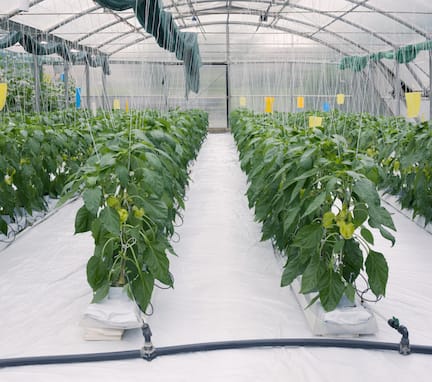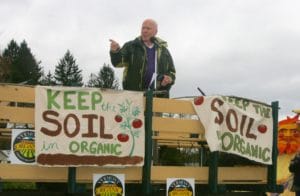Corporate Interests Lobbying to Approve Hydroponics — Growing without Soil
 |
(c) Dario Sabljak/Adobe Stock |
An organic industry watchdog contends the USDA has quietly allowed a flood of hydroponically-produced fruits and vegetables, largely imported, to be illegally labeled and sold as “organic.” This produce is generally grown under artificial lighting, indoors, and on an industrial scale. The Wisconsin-based Cornucopia Institute announced they had filed a formal legal complaint against some of the largest agribusinesses involved in the practice and their organic certifying agents.
The controversy will come to a head in mid-November, when the National Organic Standards Board (NOSB) is expected to vote on whether or not hydroponic operations (growing without soil) should be legalized for organic certification at their semiannual meeting in St. Louis. This vote comes six years after the NOSB initially reaffirmed that hydroponics and aquaponics should be prohibited under the organic label.
Disregarding that prohibition, the USDA has allowed over 100 foreign and domestic soil-less operations to become certified organic, creating unfair competition for soil-based U.S. growers. The U.S. is an outlier in international commerce as most countries prohibit the organic certification of soil-less hydroponic produce, including the 28 countries of the European Union (EU), Mexico, Japan, and Canada.
“Astute consumers have turned to organics to procure fruits and vegetables for their family knowing that certified farmers do a better job of stewarding the land by nurturing the complex biological ecosystem in the soil, which creates nutrient-dense, superior food,” said Mark Kastel, senior farm policy analyst at The Cornucopia Institute. “Hydroponic and container systems rely on liquid fertilizers developed from conventional crops or waste products. Suggesting that they should qualify for organic labeling is a specious argument.”
The Cornucopia complaint specifically targets two of the giants in U.S. hydroponic production, the organic berry behemoth, Driscoll’s, and a major tomato, cucumber, and bell pepper producer, Wholesum Harvest. Both agribusinesses have production in the U.S. and Mexico and are certified by California Certified Organic Farmers (CCOF) and Quality Assurance International (QAI), respectively.
In preparation for the upcoming vote, the USDA’s National Organic Program released a report by a task force it convened on hydroponic and aquaponic production. The 16-member “ponics” task force was charged with looking at the mounting controversy on whether these soil-less systems align with the USDA organic regulations or not. The task force report explores the debate over whether container-grown crops that rely primarily on a few added soluble nutrients meet basic tenets of the federal law governing organic production. One of the core organic tenets in the law is restoring and building soil fertility.
“Many organic stakeholders were furious that a task force was formed in the first place,” said Cornucopia’s lead scientist, Linley Dixon, PhD. “The 2010 NOSB recommendation clarified that organic farming is defined by proper soil management through tillage, crop rotation, and manuring, and therefore soil-less systems should be excluded from organic certification. Establishing the task force was viewed as a delaying tactic, a favor for domestic and international agribusinesses that are currently lobbying to overturn the current prohibition and legalize what they are already doing,” added Dixon.
Sam Welsch, a hydroponics task force member and president of the accredited organic certification agency OneCert, Inc. stated, “Even the most liberal interpretation of the 2010 recommendation would not allow the certification of any container grown crop that provides more than 50% of its fertility with liquid nutrients.”
Pioneers of the organic movement, including the “Agrarian Elders” and other diversified farmers, are incensed by the rise of “organic” hydroponics and are leading the “Keep the Soil in Organic” movement. They are witnessing firsthand the displacement of domestic organic produce with hydroponic versions.
These organic farmers argue that organic agriculture has always been entirely centered on the biological complexity found in properly managed, fertile soil.
Iconic farmer and author, Eliot Coleman, of Maine explains, “The phrase ‘organic hydroponic’ is an oxymoron—a figure of speech in which contradictory terms appear in conjunction. Hydroponic growers produce crops in sterile surroundings and douse plant roots with liquid nutrients that can never begin to duplicate the biological complexity of fertile soil.”
In addition, organic hydroponic produce, whether imported or grown by giant agribusinesses in the U.S., is not identified in the marketplace. Consumers have no way of knowing if the berries, tomatoes, peppers, or cucumbers they are purchasing are truly organic.
The Cornucopia Institute has engaged the public by distributing a proxy letter to organic stakeholders (available as a download through the hydroponics link in the projects tab on their website). The organization says it has already received thousands of originally signed letters which they will hand deliver to the NOSB at their St. Louis meeting starting November 16.
“There is a higher authority than the USDA, or even the federal courts, in these matters,” said Kastel, “and that’s the community of organic farmers, and their loyal customers who vote every day in the marketplace with their dollars. They are clearly voicing their opposition to the faux organic production that is flooding the marketplace.”
MORE:
The Cornucopia Institute has long charged that the USDA has “stacked” the National Organic Standards Board with agribusiness-friendly members of the industry’s leading lobby group, the Organic Trade Association (OTA). Current NOSB members include Carmela Beck, an employee of Driscoll’s, and Zea Sonnabend, who is compensated by CCOF to sit on the board.
Cornucopia stated that they intend to write to the NOSB chairperson and the USDA’s administrative officer who supervises the meetings, Miles McEvoy, asking them to review the apparent conflicts of interest of these two board members. Cornucopia contends that Beck and Sonnabend should recuse themselves from voting on issues related to organic hydroponic agriculture.
Driscoll’s Beck is also the subject of a federal lawsuit against the USDA, brought by Cornucopia, alleging her appointment to the board is illegal. Beck occupies a seat that Congress specifically earmarked for someone who “owns or operates an organic farm.” Cornucopia’s lawsuit states that Driscoll’s obtains the vast majority of its organic berries from contract growers, rather than from their own production, and a Freedom of Information Act query documented that Beck neither has an ownership interest nor manages Driscoll’s farming operations.
Beck was recently named the Organic Trade Association’s “Member Of The Year.”
The USDA’s 16-member hydroponics task force was primarily composed of advocates with economic interests in hydroponic technology and the committee failed to agree on a unified report. Only one of the 16 members was a soil-based produce grower. That member, farmer Dave Chapman of Vermont, describes the report’s findings like this: “One path embraces the 2010 NOSB recommendation and supports a call to action for ceasing the organic certification of all hydroponic operations. The other path allows the traditional world standards to be undermined in a blatant redefinition of organic.”
Chapman is concerned that, given how much money has been invested in hydroponics by multi-billion-dollar enterprises, the USDA will continue to hesitate to enforce the law regardless of NOSB recommendations.
The hydroponic industry has gone as far as to create and fund an “astroturf” advocacy group, the Coalition of Sustainable Organics, to promote the misleading argument that hydroponics is more sustainable than growing in soil and that adding “compost tea” to the liquid fertilizers being used in hydroponic operations creates enough biological activity to qualify as an alternative to soil.
“Research shows that the only way these soil-less container systems work is when highly processed fertilizers, like micronized fish and hydrolyzed soy protein, are used routinely,” said Dixon. “The claim that compost tea is used to provide the required nutrients is a ruse intended to make these systems seem similar to soil-based production.”
The hydrolyzed soy protein used in these systems is produced from conventionally grown crops, which USDA research has shown is commonly contaminated with toxic agrochemicals. In the U.S. almost all soybean production is genetically engineered. These conventional soybeans are processed under high heat and with strong acids to produce the nutrients that support would-be “organic” hydroponic systems.
Fish waste from factory farms, often contaminated with antibiotics and other drugs banned in organic production, is another input commonly used by hydroponic and containerized “organic” producers. Cornucopia has learned that even conventional grocery store waste, sometimes including artificial preservatives, colors or other compounds banned in organic production, is also composted and used to produce liquid fertilizer.
The hydroponics task force report describes an example of an organically certified blueberry container operation, controlled by the giant berry distributor Driscoll’s. Their approach relies on micronized fish-based liquid fertilizer and/or hydrolyzed soy protein to achieve the fertility needed to produce the blueberries, rather than soil.
Cornucopia contends that Driscoll’s hydroponic “organic” blueberries, like other similar operations, are illegal under the organic rules because their production is not based on organically managed, nutrient-rich soil.
Furthermore, Cornucopia contends that processing soybeans in high heat and powerful acids should legally define them as “synthetic” and thus make the use of this product illegal under the organic law, which bans synthetic fertilizers as a default.
For more detailed information, The Cornucopia Institute’s full set of comments submitted to the NOSB on hydroponics are publicly available. The Hydroponic and Aquaponic Task Force Report (PDF) is available on the NOP site.
Further Background on Comparing Hydroponic and Traditional Organic Agriculture:
Benefits of farming in soil include the ability to capture carbon by adding compost, manure, cover crops and crop residues, resulting in better taste and nutrition. Increasing soil organic matter and “feeding the soil, not the crop” mitigates climate change, improves drought resistance, and recycles wastes, while utilizing the complex natural biological diversity of soil to produce a healthy crop.
Many hydroponic/container operations are highly energy intensive including the need for indoor climate control, electricity for water pumping, and artificial lighting.
In many countries, including England, France, Belgium, Austria, Italy, Holland, Spain, and Germany, organic growing is limited to “grown in the ground.” Containers are only allowed in organics for transplants, ornamentals, and herbs that are sold in the same containers they are grown in so consumers can clearly see when organic plants are not grown in the ground.
Under international standards, organic sprouts, microgreens, and fodder are allowed to be grown in containers, because no fertilizers are added after planting, however, all fruits and vegetables must be grown in the ground, with no barriers between the topsoil, the subsoil, and the bedrock. Enforcement at inspection is therefore very straight-forward.
 |
In addition to the vote on hydroponics, the NOSB’s November meeting agenda includes debating a number of other organic policy issues, and the review of synthetic and non-organic materials for use in certified production.
An estimated 250 farmers and organic advocates, joined by Sen. Patrick Leahy, the primary author of the Organic Foods Production Act of 1990, giving the USDA the authority to safeguard organics, rallied last weekend in East Thetford, VT in support of “Keeping Soil in Organics.”

